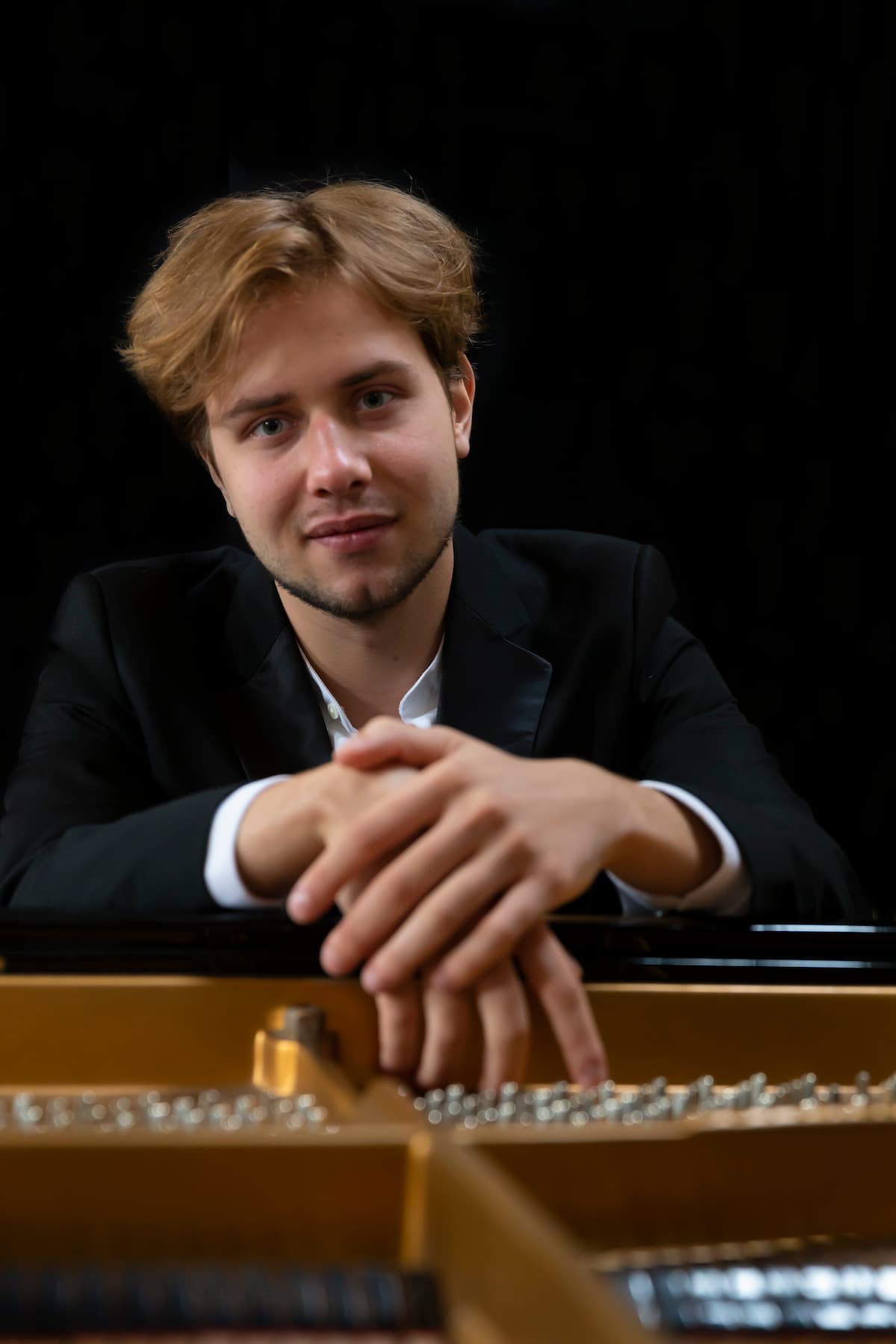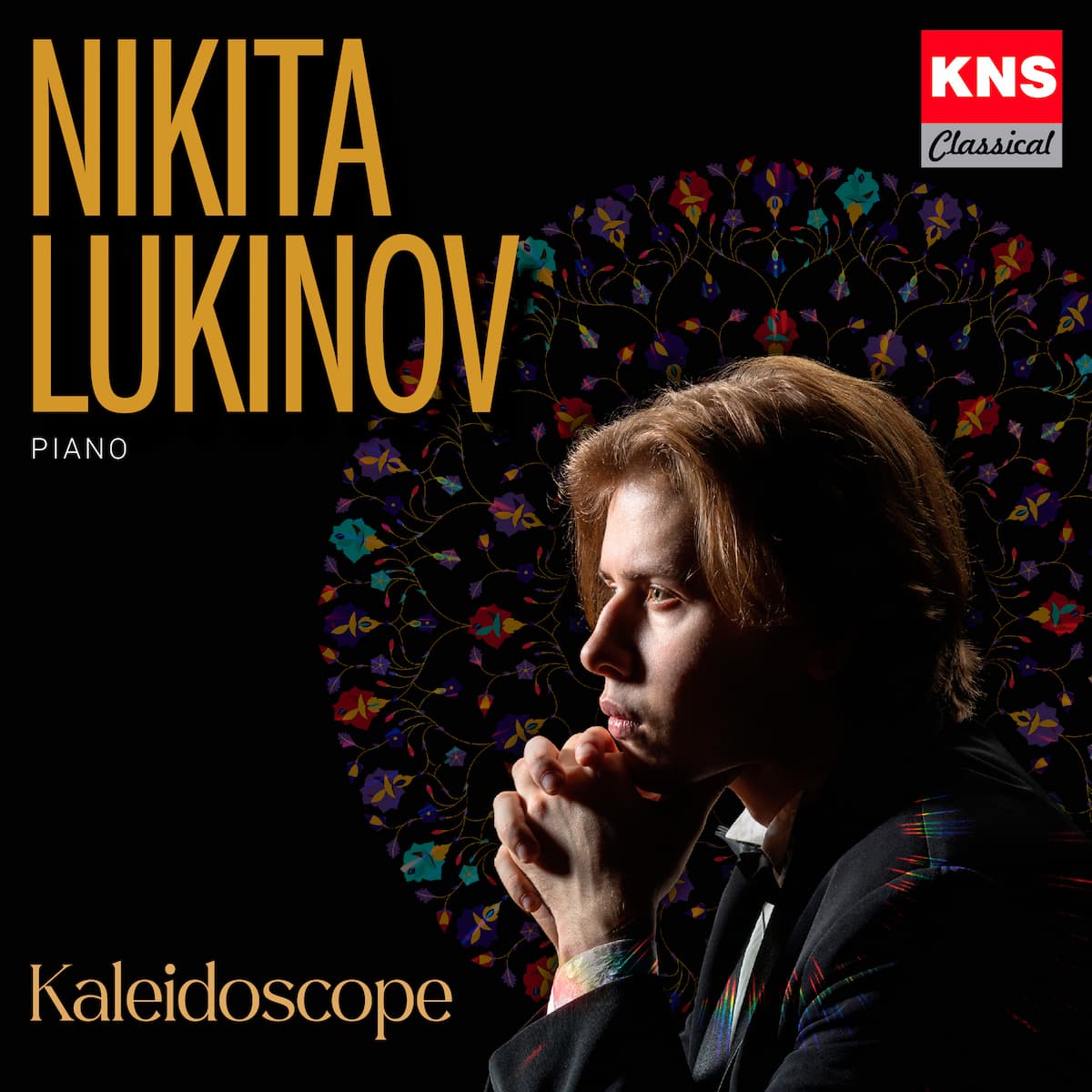Pianist Nikita Lukinov’s new recording, Kaleidoscope, gives us a very definite view of Russian pianism at the end of the 19th century and into the 20th. He chose piano miniatures by 3 pianists who are each separated by 40 years and then juxtaposes their ideas, their sound, and their music to cast light on their accomplishments.

Nikita Lukinov
He opens the recording with Tchaikovsky, the grandmaster at the end of the 19th century. His 18 Pieces, Op. 72, written about 6 months before his death in 1893, are beautiful piano miniatures that take the listener from a lullaby to a strange dance to looking back at one’s accomplishments. One of the most striking pieces is no. 16. Valse à cinq temps. This waltz, in the exceedingly odd time signature of 5/8, seems more to skip than dance, with the extra two beats being used to get back your composure, almost! Tchaikovsky, in a way that we do not expect, is pushing boundaries, pushing expectations. We know he can write a waltz; he’s written dozens. His challenge to us is if we are able to dance to his new tune.
Pyotr Ilyich Tchaikovsky: 18 Pieces, Op. 72, SVI. Valse à cinq temps (Nikita Lukinov, piano)
The Scriabin Waltz, Op. 38, on the other hand, is in a more standard three-four time but we seem to start in the middle of an idea –we just pick up and dance away, rather than having an introduction that permits us to get set, address our partner, and so on. We’re dancing away immediately. What we also hear is that this piece, written around 1903, places us firmly in the 20th century. The Romantic style is gone, replaced by something less flowery, less standard, and more thoughtful. While the left hand keeps us firmly in three-quarter notes to the bar, the right hand plays four notes to the bar, or on add accent, or with initial rests that set the measure off – we rush and pause, we stop and twirl, we dance by ourselves.
Alexander Scriabin: Valse Op. 38 (Nikita Lukinov, piano)
Prokofiev created 3 different piano collections of music from his ballet Cinderella. The ballet was written between 1940 and 1944, receiving its premiere at the Bolshoi on 21 November 1945. In the meantime, he’d written 3 piano collections of music from the ballet, 3 Pieces, op. 95 in 1942; 10 Pieces, op. 97, in 1943; and 6 Pieces, Op. 102, in 1944, all before the premiere. While the first two collections are well-known, the third one has not nearly the recognition. Lukinov found these works at the suggestion of his piano teacher Petras Geniušas in Glasgow when he was looking for piano miniatures to play.
This is Prokofiev at his 20th-century best: music with both joy and a sense of humour, but, above all, a lyricism that brings the musical line to the fore.
Sergei Prokofiev: 6 Pieces from Cinderella, Op. 102: Amoroso (Nikita Lukinov, piano)
The recording gives us music that pushes us forward. Tchaikovsky’s romanticism becomes modernized in Scriabin’s use of augmented harmonies and 13th chords, and Prokofiev takes us to tomorrow.
We asked about the recording process and he said that it had actually been recorded some 18 months ago…but, you know…..COVID. He was involved with every aspect of the recording process, aided by his teaching institution, the Royal Conservatory of Scotland. His studio access was free, but limited to only 8 hours so he had to be completely prepared when he walked in. Pianist Sergey Babyan was of particular help in advising how to prepare for his session. The Conservatory had its own sound engineers, but Mr. Lukinov also sought out help from others. He found a sound engineer in Russia and, they worked solely online to get the sound right. With the leaps in recording technology during the lockdown, the previous limitations became opportunities so the Scottish-based musician could work comfortably online with his engineer thousands of miles away. The master was sent to KNS Classical, and an album was born. He gave ample credit to the leading UK music charity, Help Musicians, for truly helping this musician.
We asked about his upcoming projects and, in addition to touring with the material from this album, is working on Schumann’s Kinderszenen. In Italy in July, he’ll be playing Mussorgsky’s Picture at an Exhibition. In August it’s Schumann and Tchaikovsky, working off the admiration that Tchaikovsky had for the German. With a laugh, Lukinov said that he was so deep into Tchaikovsky and his relationship to Schumann that, at time, Schumann was starting to sound like Tchaikovsky, albeit some 4 decades earlier!
In September, he’ll be concertizing in Scotland with concerts in Glasgow and Edinburgh and later in London at the National Liberal Club with the above-mentioned Schumann, and Pletnev’s arrangement of the Concert Suite from Tchaikovsky’s Sleeping Beauty.
Enjoy these Russian jewels – It’s Tchaikovsky, Scriabin, and Prokofiev but not how you might think of them. These piano miniatures bring out a different side to each of these composers. The album is available on Spotify, iTunes, Amazon, and YouTube.
For more of the best in classical music, sign up for our E-Newsletter

Nikita Lukinov: “Kaleidoscope”
Nikita Lukinov: Kaleidoscope. KNS Classical
2023

